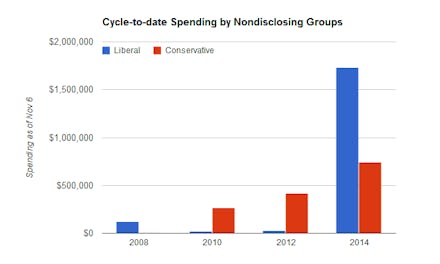Liberal Dark Money Contradicts the Campaign Finance Reform Movement

In the immediate wake of Citizens United v. Federal Election Commission, conservative dark money interests drastically outspent their liberal counterparts; however, early into the 2014 election cycle, liberals have learned how to play ball — and they’re running up the score. The only problem: they don’t believe in the game.
Citizens United, decided in January 2010, opened the floodgates for “dark money” groups — 501(c)(4) and 501(c)(6) groups that are not legally obligated to disclose their donor rolls — to contribute to political campaigns. These groups, such as Karl Rove’s Crossroads GPS and the liberal-leaning Patriot Majority USA, amass fortunes and spend their money influencing political elections across the nation, all while keeping their donor lists confidential. After the Supreme Court's decision, conservative interests demolished liberal groups in dark money spending; in the last two election cycles, conservative groups accounted for 88% and 85% of all dark money spending, respectively.
Although in a nascent stage, the 2014 election cycle is underway and liberal groups have substantially outspent conservative totals (they've spent more than conservative groups contributed at this point in the last three election cycles combined). So far, liberal contributions make up 70% of all dark money spent. Comparatively, at this point in the lead-up to the 2012 elections, liberals had contributed only 6% of the total dark money spent.
The influence of dark money can be seen just from looking at Virginia's statewide elections, and an analysis of outside spending evidences a parallel pattern. Last year, in the 2012 Senate race between Republican George Allen and Democrat Tim Kaine, 60% of a total of $52,408,125 outside money was spent by conservative organizations. However, in the last week of Virginia's 2013 gubernatorial race alone, Ken Cuccinnelli’s $278,598 from outside organizations simply could not compete with Terry McAuliffe’s $3,081,689. Liberal outside groups have mobilized and are finally ready to compete in big money elections.
While undoubtedly legal, this spike in dark money spending by liberal groups presents a seeming contradiction; despite the harsh rhetoric vilifying the Koch Brothers and other dark money financiers, these same ideologues are adopting their enemies’ strategy as their own.
One clear example is Sen. Ed Markey (D-Mass.), who likened Citizens United to the Dred Scott decision which denied African Americans the right to sue in federal court. Despite his rhetoric, Markey received nearly $800,000 in dark money support from The League of Conservation Voters during his 2013 special Senate race.
The Fund for the Republic is another perpetrator of this hypocrisy. This organization, backed by the progressive-leaning Democracy Alliance intends to end “crony Democracy” and “to combat the flood of big money into American politics”… and has raised $40 million of dark money. While it is logical that liberal groups would attempt to compete with conservatives' fundraising prowess, it is hypocritical for them to do so using the same methods they have denounced.
With only months before SCOTUS rules on McCutcheon v. Federal Election Commission (which questions the constitutionality of aggregate contribution limits), campaign finance rules may undergo another great change, potentially incentivizing individuals away from dark money groups by allowing them to contribute to as many campaigns as they like. In light of this event, only time will tell if the status quo system will be in tact for next year’s midterm elections.
Although we are still at the beginning of the 2014 election cycle, the increasing proclivity for dark money spending by liberal organizations presents a great conflict between their ideals and strategies; unfortunately for these groups, their hypocritical actions undermine their arguments.